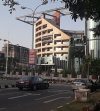Death of Idriss Déby Itno after his re-election, pre-election violence in Benin, defeat of Edgar Lungu in Zambia… The year 2021 in Africa has been marked by events that have changed the political landscape of the continent. In a context still marked by the covid-19 pandemic, the year 2022 also promises to have its share of political battles, revolving around important presidential, local or legislative elections, depending on the issues. From Angola to Senegal via Kenya, an overview of the main electoral deadlines that will mark African political news in 2022.
Kenya: end clap for Uhuru Kenyatta
After two successive terms at the head of Kenya, President Uhuru Kenyatta will lay down his apron in August 2022. Son of the first President of the Kenyan Republic, the 60-year-old leader is no longer eligible for a new term in accordance with the Constitution of the country. In eight years at the helm of the country, his two mandates have been marked by major infrastructure projects, an ambitious development plan called the “Big Four Agenda”, but also by corruption and tax evasion scandals, as well as criticism of his management of the country’s public debt.
To succeed him, many candidates should come forward in the coming months. Already, observers see two personalities standing out, namely: Vice-President William Ruto and historical opponent Raila Odinga. If the first can boast of having a solid electoral base reinforced by his alliance with Uhuru Kenyatta, the second holds his last opportunity to access the supreme magistracy, after several failures in previous attempts.
Several analysts believe that Mr. Kenyatta will continue to weigh on the political spectrum of his country. Proof of his desire not to withdraw completely from Kenyan political life, he has tried in recent months to push through a constitutional reform which provided for the creation of new posts, including those of Prime Minister and Deputy Ministers, to make ministers from members of parliament and to assign a post to the leader of the opposition. Although this reform has been deemed unconstitutional, the leader of the Jubilee Party of Kenya still has sufficient electoral support to swing the next election one way or the other, by giving voting instructions.
Angola: Joao Lourenço puts his chair back in play
In 2022, Angolan political news should be one of the most followed on the African continent. And for good reason, during the month of August, President Joao Lourenço will put his chair back into play, in a presidential election that promises to be tense.
As a reminder, Mr. Lourenço has been at the head of the country since 2017. As soon as he arrived, he launched an anti-corruption campaign that caused many heads to fall in the camp of his predecessor Eduardo dos Santos. The latter’s children, Isabel and José Filomeno dos Santos, have thus been pinned down in corruption scandals, having the effect of deteriorating relations between the historic dos Santos clan and the new Lourenço clan which, it should be remembered, belong to all the two to the MPLA, the ruling party.
Although it is currently difficult to identify a real opposition figure capable of contesting a second term for President Lourenço at the polls, many observers believe that the next election will have the appearance of a popular referendum for or against the reforms implemented since he came to power. Nevertheless, the return to the country last September of the former president, and the announcement of a possible candidacy of Isabel dos Santos could put suspense in an election which, in the opinion of several experts, seems to be played on advance.
Senegal: test elections for Macky Sall
In Senegal, the political news in 2022 will be marked by the organization of legislative elections intended to renew the 165 seats of the National Assembly. If the ballot seems less crucial than a presidential election, it should nevertheless be emphasized that its importance is not the least, especially in the current national political context.
During the 2017 legislative elections, Senegalese President Macky Sall succeeded in obtaining an absolute majority in Parliament, thanks to the victory of the United by Hope coalition, which included the Alliance for the Republic (APR), his political party. . But since then, political tensions have arisen in the country, contributing to the deterioration of the social climate.
Since his re-election in 2019 against the backdrop of the legal conviction of two of his main opponents, the country has been marred by violent demonstrations sparked by socio-political demands. In March 2021, as the country was bearing the full brunt of the economic consequences of covid-19, violent riots erupted in the streets of Dakar to protest against the arrest of Ousmane Sonko, an opposition figure, and considered as one of Mr. Sall’s main political opponents.
Less than a year after these facts, the next legislative elections sound like a test for the Head of State, who remains vague about his ambitions for a third term, and faced with an opposition that promises to wage a serious electoral battle against the presidential movement. A first full-scale rehearsal of this important electoral deadline will be the organization of the 2022 local elections, expected for this month of January.
Gambia: second post-Jammeh legislative elections
After having organized its first presidential election of the Adama Barrow era, The Gambia is preparing to hold the second legislative elections in its history, since the fall of former dictator Yahya Jammeh. If this election is an opportunity to celebrate the new Gambian democracy, it should be noted that it takes place in a tense political and social context.
The 2021 election campaign had given rise to tensions between President Barrow and his opponents. Criticized for his management of the country since coming to power, the leader had also suffered a snub in his attempt to introduce new constitutional revisions, imposing in particular the limitation of presidential terms and the possibility for the president to designate his vice-president. Following this failure, the former businessman created his own party, the National People’s Party (NPP) with which he ran in the election which he won.
Next April, Mr. Barrow will have to win back a Parliament that was favorable to him when he came to power. Recall that the current majority party in the Gambian Parliament is the UDP of historical opponent Oussainou Darboe, who came second in the presidential election of December 2021.
Lesotho: who to succeed Tom Thabane?
This year, Lesotho will hold legislative elections to renew its Parliament. A total of 120 seats will be up for grabs, with the post of Prime Minister of the government in accordance with the system of constitutional monarchy in force in the country.
Scheduled for September 2022, the next election takes place in a tense socio-political context in this southern African kingdom. Since 2020, Prime Minister Thomas Thabane and his wife Maesaiah Thabane have been prosecuted for the assassination of former first lady Lipopelo Thabane. Suspected with his current wife of being involved in the murder of his former wife about three years ago, the now ex-head of government had to resign, after being put under pressure for several weeks by his own party, so that he leaves office.
While this sulphurous trial is still at the heart of Lesotho news, the country will have to deal with covid-19 and the lack of budget which had already led to a postponement of the ballot from June to September. Again, three parties are vying for leadership in Parliament: the All Basotho Convention (ABC), the Democratic Congress and the Lesotho Democracy Congress.
Mali, Libya, Somalia
Although several countries are preparing to hold important elections, 2022 will also be the year of all the uncertainties for others. In Mali, the Transition government has announced that it will organize general elections within five years, further diminishing hopes of an election next February.
In Somalia, tensions between the Prime Minister, Mohamed Hussein Roble, and President Mohamed Farmajo continue to complicate the continuation of an electoral process which should make it possible to renew Parliament and elect a new president. As for Libya, the systematic postponement of the elections, since the talks between the main actors in the civil war have made the holding of the first free and democratic elections in the country a real sea serpent, for several years.




















Réagissez à cet article